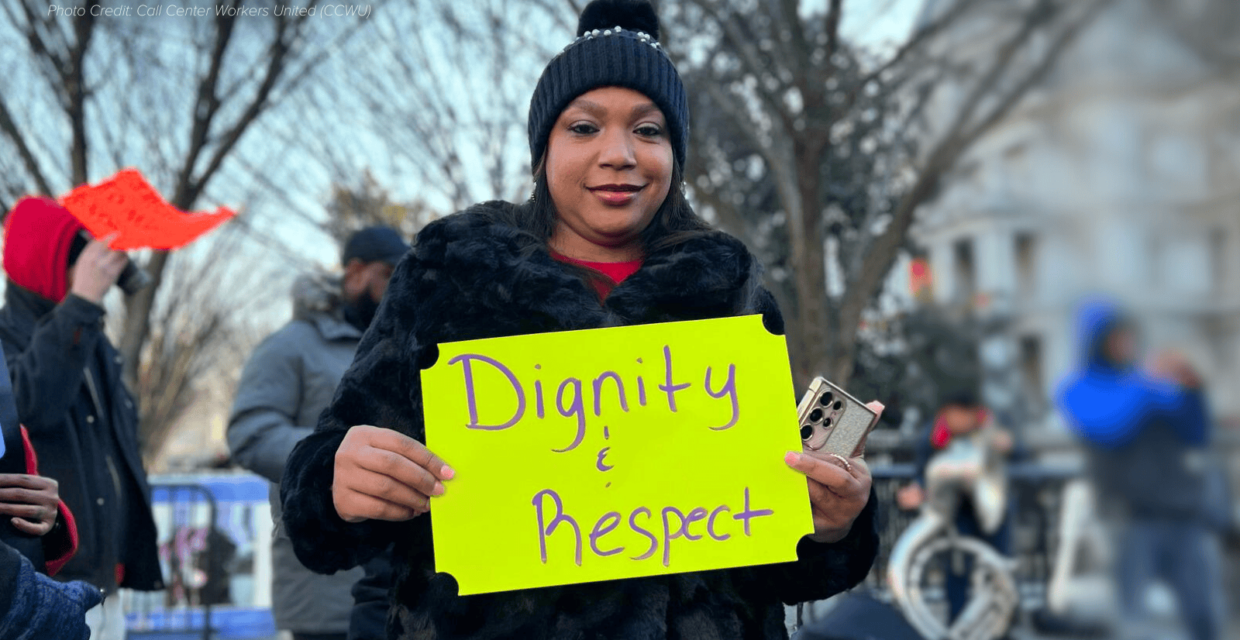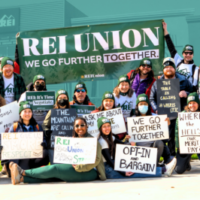
This report seeks to deepen understanding, highlight stories and strengths, and build a collaborative community with Black women workers. In tandem with our newly released factsheet: Occupational Segregation of Black Women Workers in the U.S., we hope to provide insights on race, gender, experiences with the carceral system, and factors influencing Black women’s lives.
Transforming Work for Black Women Workers
NELP envisions a world where Black women workers are free, well-paid, safe, respected, can grow, and joyfully live the lives of their dreams. Our year-long conversations with Black women workers across the country have helped us anchor in this abundant vision of the narrative, policy, and system shifts needed to transform the economic lives of Black women, their families, and communities.
As we previously shared, NELP embarked on our own deep study of the long lineage of research, advocacy, and community activism centered on occupational segregation and Black women.1
To sharpen NELP’s advocacy for Black women workers, we initiated new research analyses of recent American Community Survey (ACS) data focused on the segregation of Black women.
NELP envisions a world where Black women workers are free, well-paid, safe, respected, can grow, and joyfully live the lives of their dreams.
We also directly engaged Black women workers across the country through collected oral histories, one-on-one interviews and a Black Women Workers Roundtable. We wanted to understand directly from Black women workers their lived experience of occupational segregation; how they understand and articulate occupational segregation in their work; and, most importantly, how they activate their power and agency in service of their dreams and aspirations, families, and communities.
This report seeks to deepen understanding, highlight stories and strengths, and build a collaborative community with Black women workers. In tandem with our newly released factsheet: Occupational Segregation of Black Women Workers in the U.S., we hope to provide insights on race, gender, experiences with the carceral system, and factors influencing Black women’s lives.2 We also hope these tools help workers, advocates, and policymakers ensure that Black women worker voices, experiences, and demands are central to their efforts.
Our conversations with Black women workers underscored core narratives that shape and guide our work:
- Abundance: In the resource-rich United States, we have the capacity to afford solutions that address the challenges faced by Black women, their families, and communities.
- Dignity & Agency: Black workers and communities possess inherent dignity and worth. Black life and Black women should always be respected and valued. Black women having spaces to dream, innovate, and grow in their desired work honors this inherent dignity.
- Accountability: It is the government’s and employers’ responsibility to provide economic security and good jobs. It is our responsibility as advocates to push for solutions that center the specificity and totality of Black women’s experiences.
Our conversations with Black women workers also helped us understand that to achieve the most robust and sustained impact in addressing occupational segregation for Black women, narrative shifts and policy solutions must concurrently:
- Build and fortify the scaffolding of “good” work, expansively defined, and particularly focused on wages, benefits, working conditions, career growth opportunities.
- Name and address anti-Black racism, discrimination, and misogynoir that Black women experience in their work.
- Expand worker power and voice for Black women workers.
- Support and create the spaces for Black women workers to vision, dream, and innovate.
Finally, our conversations with Black women workers emphasized how the carceral system and anti-Black criminalization of Black communities amplify the impacts of occupational segregation. Over the past several years NELP has illustrated the ways the carceral system shapes work by:
- Criminalizing workers;
- Using probation, parole and community service as exploitative mechanisms to degrade work for people with records;
- Pressuring Black women to stay in bad, underpaid, and/or carceral system focused jobs.3
Continued research and advocacy must bring to the forefront the nuanced ways the carceral system exacerbates occupational segregation for Black women workers; we must ensure our solutions address the full picture of Black women’s experiences.
In this report we are intentional in our use of Black women workers. Since slavery, misogynistic anti-Black narratives reduced the value of Black women solely to their labor and ability to produce. In essence making the labor of Black women both hyper visible (tropes of the mammy primed for backbreaking labor, “lazy and irresponsible” Black women who must be coerced into work) and invisible (exclusion of Black women from federal workers’ rights protections and advancements). We focus on Black women workers, as an essential component to achieving economic transformation for all workers.
Related to
- Kemi Role and Shayla Thompson, “Celebrating Strength and Resistance: The Black Women Workers Roundtable,” NELP (blog), December 26, 2023, https://www.nelp.org/blog/celebrating-strength-and-resistance-the-black-women-workers-roundtable/.
- Occupational Segregation of Black Women Workers in the U.S., Fact Sheet (New York: National Employment Law Project, 2024), https://www.nelp.org/wp-content/uploads/NELP-Fact-Sheet-Black-Women-Workers-Confront-Occupational-Segregation-4-2024.pdf
- Han Lu, “Worker Power in the Carceral State 10 Policy Proposals Against the Criminalization of Workers,” NELP (blog), August 25, 2023, https://www.nelp.org/publication/worker-power-in-the-carceral-state-10-policy-proposals-against-the-criminalization-of-workers/; Han Lu and Laura Padin “Testimony of Han Lu and Laura Padin in Support of Bill 2318-2021, Licensing of Labor Brokers”, NELP, September 15, 2021, https://www.nelp.org/publication/testimony-of-han-lu-laura-padin-in-support-of-bill-2318-2021-licensing-of-labor-brokers/; Han Lu and Noah Zatz, “Minimum Protection, Maximum Vulnerability: Labor Standards in Court-Ordered Community Service”, NELP, March 18, 2024, https://www.nelp.org/publication/minimum-protection-maximum-vulnerability-labor-standards-in-court-ordered-community-service/; Han Lu, “Hustling Against Criminalization and Its Employment,” NELP (blog), April 3, 2023, https://www.nelp.org/blog/hustling-against-criminalization-and-its-employment/.




